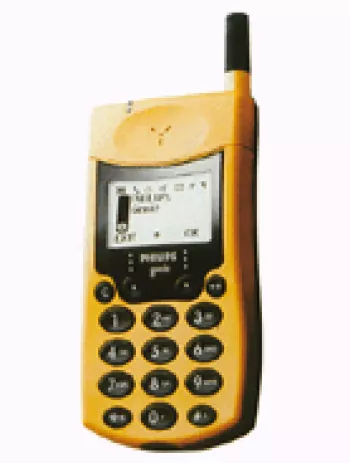
Overview of Philips Xenium K600
The Philips Xenium K600, released in May 2010, was a significant player in the feature phone market, known for its long-lasting battery and practical design. Although discontinued, it remains a point of interest for enthusiasts of classic mobile phones due to its solid feature set and durability.
Design and Build
With dimensions of 103 x 52 x 14 mm and a weight of 119 grams, the Philips Xenium K600 is both compact and robust. It features a classic design with a Mini-SIM slot and is available in two elegant colors: Silver and Black. The phone's exterior brims with a sense of minimalism and utility, ensuring it remains comfortable during extended periods of use.
Display
The device sports a 2.8-inch TFT resistive touchscreen that supports 256K colors. While the 240 x 400-pixel resolution might seem modest by today's standards, it was quite competitive for feature phones of its era. The screen's ~41.7% screen-to-body ratio offers a sufficient display area for basic tasks like texting and browsing through the phone’s menu.
Camera
In terms of photography, the Xenium K600 is equipped with a 3.2 MP autofocus main camera capable of capturing images and QCIF videos at 15fps. Although it lacks a selfie camera, the main camera provides enough functionality for capturing moments, marking a step forward from the very basic cameras commonly found in phones from its release period.
Memory and Storage
The phone comes with an internal memory of 48MB, which was relatively standard at the time for storing essential system files. For users requiring additional storage, the phone supports microSDHC cards via a dedicated slot, providing flexibility for multimedia files and additional applications. The phonebook can store up to 1000 entries and offers a photocall feature, which adds convenience for users who maintain a large contact list.
Network and Connectivity
The Philips Xenium K600 supports GSM technology with 2G bands covering GSM 900/1800/1900 frequencies. It includes GPRS Class 12, ensuring moderate data connectivity, and EDGE support for slightly faster data rates. Although the phone lacks WLAN, it supports Bluetooth 2.0 with A2DP for wireless audio streaming and file transfers. Additionally, it comes with a stereo FM radio with RDS and a miniUSB 2.0 port for wired connectivity.
Battery and Performance
One of the standout features of the Philips Xenium series has always been the battery life. The K600 features a removable Li-Ion 1000 mAh battery, delivering impressive standby times of up to 744 hours and talk time up to 8 hours and 30 minutes. This performance is especially useful for users in areas with unreliable power supply or those who travel frequently. The device also allows for up to 25 hours of music playback, underscoring its efficiency in power consumption.
Operating System and Features
Working as a feature phone, the Xenium K600 doesn’t rely on a modern operating system, but it does provide essential phone functionalities reliably. It supports messaging features like SMS (with threaded view), MMS, and Email, catering to basic communication needs. The browser supports WAP 2.0/xHTML, sufficient for simple browsing experiences. Moreover, the device comes with Java (MIDP 2.0) support, allowing users to install and run basic Java applications and games.
Sound and Multimedia
For audio, the Xenium K600 offers a loudspeaker and a 3.5mm headphone jack, ensuring compatibility with most earphones. This makes it a feasible option for music lovers who can enjoy tracks through headphones or the built-in stereo FM radio. With such capabilities, the phone served as an adequate entertainment device for its time.
Conclusion
The Philips Xenium K600 represented a balanced offering for users seeking durability and basic functionality without sacrificing essential features like a dependable battery life and decent multimedia support. Although technology has vastly changed since its release, the Xenium K600 serves as a reminder of the era when feature phones were the norm, providing reliable service with no frills. Its design and feature set provide insight into consumer demands at the time and highlight the evolution of mobile technology over the past decade.
Key Features of Philips Xenium K600
- Compact design with dimensions of 103 x 52 x 14 mm and weight of 119 g for easy portability.
- 2.8-inch TFT resistive touchscreen with 256K colors providing a vibrant display.
- Expandable storage through microSDHC card slot.
- 3.2 MP primary camera with autofocus for decent picture quality.
- 3.5mm audio jack and loudspeaker for enhanced audio experience.
- Bluetooth 2.0 with A2DP support for wireless connectivity.
- Stereo FM radio with RDS for listening to your favorite stations.
- Long battery life with up to 744 hours of standby and up to 8 hours 30 minutes of talk time.
- Music playtime up to 25 hours for extended listening sessions.
- Supports multiple messaging formats: SMS, MMS, and Email.
Philips Xenium K600 Drawbacks
- Limited Network Support: Only supports GSM technology.
- Outdated Display: Uses a resistive touchscreen which can be less responsive compared to capacitive ones.
- Low Resolution: The screen resolution is relatively low at 240 x 400 pixels.
- Limited Internal Storage: Only offers 48MB of internal memory.
- Basic Camera: The main camera is 3.2 MP with no selfie camera available.
- Lacks Modern Connectivity: No WLAN, GPS, or advanced network technologies.
- Minimal Sensor Support: No sensor features mentioned.
- Discontinued model: The phone was discontinued, limiting support and updates.
- Low Video Capability: Video recording at QCIF@15fps is low by modern standards.


View Also
More Phones
All Rights Reserved +14266 Phones © Mobilawy 2025

























